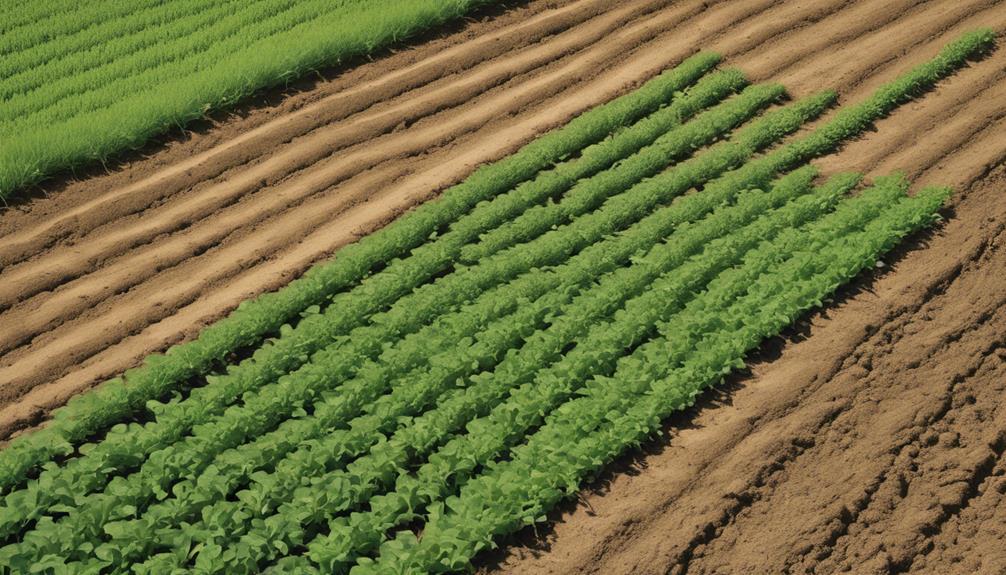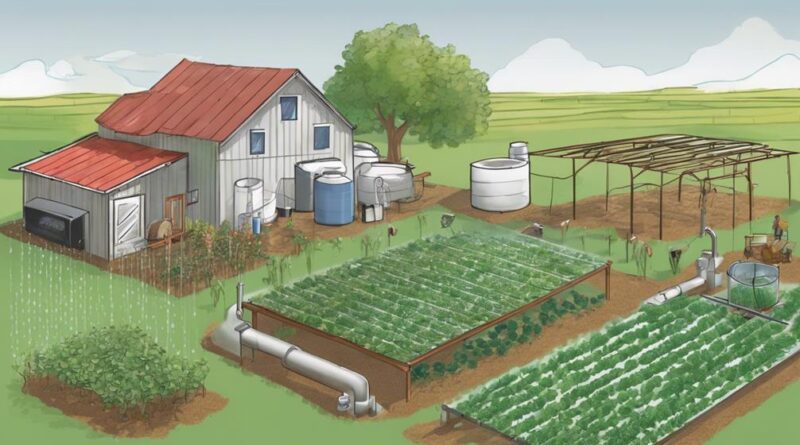What Ethical Farming Techniques Conserve Water?
To conserve water ethically in farming, consider drip irrigation systems, cover cropping, rainwater harvesting, mulching techniques, rotational grazing, companion planting, soil health practices, and permeable pathways. Drip systems deliver water efficiently to plant roots, soil health practices enhance water retention, and rotational grazing reduces runoff. Companion planting aids in pest control and water conservation. By incorporating these strategies, you can optimize water use while maintaining agricultural productivity and sustainability. Further insights into these techniques and their benefits are available in the comprehensive guide provided.
Drip Irrigation Systems
Implementing drip irrigation systems can significantly reduce water wastage in agriculture while promoting sustainable farming practices. Drip irrigation is a method that delivers water directly to the roots of plants through a network of tubes, pipes, and emitters. This targeted approach ensures efficient watering by minimizing evaporation and runoff, thus maximizing water usage and reducing overall consumption.
In sustainable agriculture, the use of drip irrigation systems plays a crucial role in conserving water resources. By providing a controlled amount of water precisely where it's needed, farmers can optimize plant growth while minimizing water loss. Studies have shown that drip irrigation can result in water savings of up to 50% compared to traditional irrigation methods, making it a key technology for sustainable water management in agriculture.
Furthermore, drip irrigation systems contribute to sustainable agriculture by promoting soil health and reducing the risk of water-related plant diseases. By maintaining consistent soil moisture levels and preventing waterlogging, these systems create optimal conditions for plant growth without the need for excess water. This not only conserves water but also enhances crop yields and quality, making drip irrigation a valuable tool for farmers looking to adopt environmentally friendly and ethical farming practices.
Cover Cropping
To further enhance water conservation efforts and promote sustainable farming practices, another effective technique utilized by farmers is cover cropping. Cover cropping involves planting specific crops during off-seasons or alongside primary crops to protect and enrich the soil.
One of the key benefits of cover cropping is soil enrichment. These crops, such as legumes or grasses, add organic matter to the soil as they decompose, improving soil structure and fertility. This enhanced soil health leads to increased water infiltration and retention, crucial for sustainable agriculture.
Moreover, cover crops play a vital role in water retention. The root systems of cover crops help prevent soil erosion by holding the soil in place, reducing runoff and allowing water to infiltrate into the ground. This process not only conserves water but also helps in maintaining soil moisture levels, especially during dry periods.
Additionally, cover crops can reduce the need for irrigation by enhancing the soil's ability to retain moisture, ultimately benefiting the overall water conservation efforts on farms.
Rainwater Harvesting
Utilizing rainwater harvesting techniques is a practical method for maximizing water resources on farms while promoting sustainability and conservation practices. Water conservation is a critical aspect of sustainable agriculture, and rainwater harvesting offers a cost-effective solution to mitigate water scarcity issues. By collecting rainwater through various systems like rain barrels, cisterns, or rooftop harvesting, farmers can reduce their reliance on traditional water sources such as groundwater or surface water, thus contributing to the preservation of these valuable resources.
Rainwater harvesting systems can be tailored to meet the specific needs of different farm sizes and types, making it a versatile option for water management. Implementing such techniques not only helps in maintaining adequate water supplies for crops and livestock but also reduces the impact of agriculture on local water systems. This aligns with the principles of sustainable agriculture by promoting efficient resource utilization and minimizing environmental degradation.
Furthermore, rainwater harvesting encourages farmers to adopt proactive measures towards water conservation, fostering a mindset of responsibility and stewardship. It empowers individuals in the agricultural sector to actively participate in sustainable practices that benefit both their operations and the broader ecosystem. As a result, rainwater harvesting stands out as a practical and impactful approach towards achieving water sustainability in farming contexts.
Mulching Techniques
Mulching techniques play a pivotal role in enhancing soil moisture retention and weed suppression within agricultural settings. By covering the soil with organic materials like straw, leaves, or compost, farmers can significantly reduce water evaporation, keeping the soil moist for longer periods. This water retention capability is crucial in regions facing water scarcity or erratic rainfall patterns. Studies have shown that mulching can decrease water usage by up to 50% compared to bare soil conditions.
In addition to water conservation, mulching also aids in weed suppression. The physical barrier created by the mulch layer inhibits weed seed germination and growth by blocking sunlight. This natural weed control method reduces the need for synthetic herbicides, promoting a more sustainable farming approach. Moreover, as the mulch materials decompose over time, they enrich the soil with essential nutrients, fostering healthier plant growth.
Farmers can choose from various mulching techniques such as sheet mulching, straw mulching, or wood chip mulching, depending on their specific needs and crop types. Each method offers unique benefits in terms of water conservation and weed management. Implementing mulching practices not only contributes to water conservation efforts but also enhances soil health and overall crop productivity in an environmentally friendly manner.
Rotational Grazing
Implementing rotational grazing practices in agricultural systems involves strategically moving livestock between designated grazing areas to optimize pasture health and animal productivity. This method not only benefits the grass-fed livestock by providing them with fresh forage regularly but also plays a crucial role in water conservation efforts. Grazing management under rotational systems helps in reducing water usage compared to continuous grazing methods. By allowing pastures to rest and recover between grazing periods, rotational grazing enhances the overall health of the vegetation, leading to improved water infiltration and retention in the soil.
Studies have shown that rotational grazing systems can significantly decrease water runoff and soil erosion, ultimately aiding in preserving water resources on farms. This sustainable approach to grazing also promotes biodiversity and encourages the growth of diverse plant species, which further contributes to water conservation efforts. Through careful planning and execution of grazing rotations, farmers can create a balance between livestock needs and environmental sustainability.
Companion Planting
How does companion planting enhance crop health and water conservation efforts in agricultural systems?
Companion planting, a form of intercropping, offers various benefits that contribute to sustainable farming practices. One of the key advantages of companion planting is its ability to improve pest management strategies naturally. By planting certain crops together, farmers can deter pests effectively without the need for chemical pesticides. For instance, planting marigolds alongside tomatoes can help repel nematodes, thus reducing the reliance on harmful chemicals while maintaining crop health.
Moreover, companion planting can enhance water conservation efforts by creating a more diverse and balanced ecosystem within the agricultural environment. The combination of different plant species can help improve soil structure, moisture retention, and nutrient cycling. For example, planting legumes alongside grains not only promotes nitrogen fixation in the soil but also helps conserve water by reducing the need for additional irrigation.
Soil Health Practices

Companion planting, known for its benefits in pest management and water conservation, sets the foundation for implementing effective soil health practices in sustainable farming systems. One crucial aspect of maintaining soil health in ethical farming is through the use of composting. Composting benefits the soil by providing essential nutrients for plant growth and improving its structure, which in turn enhances water retention. Sustainable agriculture heavily relies on conservation methods to ensure the longevity of farmland and the environment. By incorporating composting practices into farming routines, farmers can improve soil health, reduce water runoff, and minimize the need for synthetic fertilizers.
Furthermore, sustainable agriculture emphasizes the importance of implementing conservation methods that promote soil health. Practices such as minimal tillage, cover cropping, and crop rotation play a significant role in maintaining soil structure, enhancing water infiltration, and reducing erosion. These techniques not only improve soil health but also contribute to water conservation efforts on farms. By adopting sustainable soil health practices, farmers can mitigate the environmental impact of agriculture, preserve water resources, and promote long-term sustainability in food production. In conclusion, the integration of composting benefits and sustainable agriculture practices is essential for conserving water and enhancing soil health in ethical farming systems.
Permeable Pathways
Permeable pathways in farming systems facilitate efficient water absorption and reduce runoff, contributing to sustainable water management practices. Implementing permeable pathways can have various benefits on the farm, related to water retention and soil erosion.
- Water Retention
Permeable pathways allow water to infiltrate the soil more effectively, reducing the amount of water lost to runoff. This increased water retention can help ensure a stable water supply for crops, especially during dry periods.
- Soil Erosion Prevention
By absorbing water and reducing runoff, permeable pathways also play a crucial role in preventing soil erosion. Erosion can strip away valuable topsoil, which is rich in nutrients necessary for plant growth. Permeable pathways help keep the soil in place, maintaining its health and productivity.
- Nutrient Management
In addition to water retention and erosion prevention, permeable pathways aid in nutrient management. They can help prevent nutrient runoff by allowing water to slowly percolate through the soil, giving it more time to absorb essential nutrients. This process helps in maintaining soil fertility and reducing the environmental impact of excess nutrients reaching water bodies.
Incorporating permeable pathways into farming systems is a practical and effective way to promote sustainable water management practices, enhance water retention, prevent soil erosion, and improve overall soil health and productivity.
Conclusion
In conclusion, implementing ethical farming techniques such as drip irrigation systems, cover cropping, rainwater harvesting, mulching techniques, rotational grazing, companion planting, soil health practices, and permeable pathways can help conserve water resources.
By incorporating these practices into farming operations, farmers can't only reduce water usage but also promote sustainability and environmental conservation.
It's crucial for farmers to prioritize ethical farming practices to ensure the long-term health of our water sources and ecosystems.
